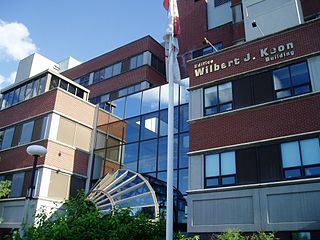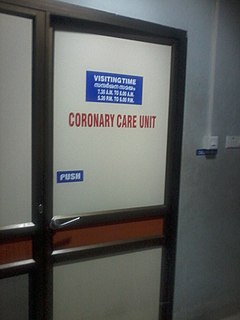Related Research Articles

A respiratory therapist is a specialized healthcare practitioner trained in critical care and cardio-pulmonary medicine in order to work therapeutically with people suffering from acute critical conditions, cardiac and pulmonary disease. Respiratory therapists graduate from a college or university with a degree in respiratory therapy and have passed a national board certifying examination. The NBRC is the not-for-profit organization responsible for credentialing the seven areas of Respiratory Therapy in the United States.

Intensive care medicine, also called critical care medicine, is a medical specialty that deals with seriously or critically ill patients who have, are at risk of, or are recovering from conditions that may be life-threatening. It includes providing life support, invasive monitoring techniques, resuscitation, and end-of-life care. Doctors in this specialty are often called intensive care physicians, critical care physicians or intensivists.

The University of Ottawa Heart Institute (UOHI) (French: Institut de cardiologie de l'Université d'Ottawa ) is Canada's largest cardiovascular health centre. It is located in Ottawa, Ontario, Canada. It began as a department in The Ottawa Hospital, and since has evolved into Canada's only complete cardiac centre, encompassing prevention, diagnosis, treatment, rehabilitation, research, and education.

A coronary care unit (CCU) or cardiac intensive care unit (CICU) is a hospital ward specialized in the care of patients with heart attacks, unstable angina, cardiac dysrhythmia and various other cardiac conditions that require continuous monitoring and treatment.
Nursing credentials and certifications are the various credentials and certifications that a person must have to practice nursing legally. Nurses' postnominal letters reflect their credentials—that is, their achievements in nursing education, licensure, certification, and fellowship. The letters usually appear in the following order:

An intensive care unit (ICU), also known as an intensive therapy unit or intensive treatment unit (ITU) or critical care unit (CCU), is a special department of a hospital or health care facility that provides intensive care medicine.
Case management is a managed care technique within the health care coverage system of the United States. It involves an integrated system that manages the delivery of comprehensive healthcare services for enrolled patients. Case managers are employed in almost every aspect of health care and these employ different approaches in the control of clinical actions.

Adventist HealthCare Shady Grove Medical Center is a 266-licensed bed acute care facility located in Rockville, Maryland. Shady Grove Medical Center provides a range of health services to the community such as high-risk obstetrical care, cardiac and vascular care, oncology services, orthopedic care, surgical services and pediatric care. Opened in 1979 as Shady Grove Adventist Hospital, Shady Grove Medical Center operates as part of Adventist HealthCare, a health-care delivery system that includes hospitals, home health agencies and other health-care services. Adventist HealthCare is headquartered in Gaithersburg, Maryland.

Critical care nursing is the field of nursing with a focus on the utmost care of the critically ill or unstable patients following extensive injury, surgery or life threatening diseases. Critical care nurses can be found working in a wide variety of environments and specialties, such as general intensive care units, medical intensive care units, surgical intensive care units, trauma intensive care units, coronary care units, cardiothoracic intensive care units, burns unit, paediatrics and some trauma center emergency departments. These specialists generally take care of critically ill patients who require mechanical ventilation by way of endotracheal intubation and/or titratable vasoactive intravenous medications.
In the United States, a psychiatric-mental health nurse practitioner (PMHNP) is an advanced practice registered nurse trained to provide a wide range of mental health services to patients and families in a variety of settings. PMHNPs diagnose, conduct therapy, and prescribe medications for patients who have psychiatric disorders, medical organic brain disorders or substance abuse problems. They are licensed to provide emergency psychiatric services, psychosocial and physical assessment of their patients, treatment plans, and manage patient care. They may also serve as consultants or as educators for families and staff. The PMHNP has a focus on psychiatric diagnosis, including the differential diagnosis of medical disorders with psychiatric symptoms, and on medication treatment for psychiatric disorders.
In the United States, anesthesia can be administered by physician anesthesiologists, an anesthesiologist assistant, or nurse anesthetist.
Mercy General Hospital is a not-for-profit private community hospital located in the East Sacramento neighborhood of Sacramento, CA. The hospital has 342 beds and over 2,000 clinical staff, and serves as the major Cardiac Surgery referral center for the Greater Sacramento Service Area Dignity Hospitals, as well as for Kaiser Permanente. The Mercy Heart Institute and the Mercy Stroke Center are key features of the hospital. It is a member of the Dignity Health network.
The American Nurses Credentialing Center (ANCC), a subsidiary of the American Nurses Association (ANA), is a certification body for nursing board certification and the largest certification body for advanced practice registered nurses in the United States, as of 2011 certifying over 75,000 APRNs, including nurse practitioners and clinical nurse specialists.
St. Cloud Hospital is a hospital in St. Cloud, Minnesota, United States. It is a Catholic-affiliated, not-for-profit institution and part of the CentraCare Health System. The hospital has more than 9,000 employees, 400 physicians and 1,200 volunteers. It serves 690,000 people in a 12-county area.

A family nurse practitioner (FNP) provides continuing and comprehensive healthcare for the individual and family across all ages, genders, diseases, and body systems. Primary care emphasizes the holistic nature of health and it is based on knowledge of the patient in the context of the family and the community, emphasizing disease prevention and health promotion.
Margretta (Gretta) Madden Styles, EdD, RN, FAAN was an American nurse, author, educator and nursing school dean who conceived and helped establish national standards for certifying nurses in pediatrics, cardiology and other medical specialties. Dr. Styles was the president of the American Nurses Association from 1986 to 1988, and wrote five books and many articles published in medical journals.
Public health nursing, also known as community health nursing is a nursing specialty focused on public health. The term was coined by Lillian Wald of the Henry Street Settlement, or, Public health nurses (PHNs) or community health nurses "integrate community involvement and knowledge about the entire population with personal, clinical understandings of the health and illness experiences of individuals and families within the population." Public health nursing in the United States traces back to a nurse named Lillian Wald who, in 1893, established the Henry Street Settlement in New York City and coined the expression "public health nurse". A Public or Community Health Nurse is expected to comply with the duties and limitations of the American Nurse Association (ANA) publication Public Health Nursing: Scope and Standards of Practice.
Advanced practice registered nurses (APRNs) are registered nurses with graduate degrees in nursing. APRN roles include: certified nurse midwife, clinical nurse specialist, certified registered nurse anesthetist, and nurse practitioner. APRNs assess, diagnose, manage patient medical problems, order diagnostic tests, and prescribe medications. Rules, regulations, and credentialing for APRNs vary by state. This page outlines the regulatory processes for nurse practitioners in Wisconsin, including education, certification, licensing, and credentialing. Regulatory and credentialing processes are continuously changing, and the information contained on this page is current as of November 2015.
Nursing is the largest healthcare profession in the United States, with more than 3.1 million registered nurses. Between 2012 and 2022, employment for nurses is projected to grow by 19 percent, which is more than any other profession. Nurses make up the largest component of staff in hospitals but are also able to provide care in clinic settings, patient's homes, schools, nursing homes, public health agencies, and mental health centers. In addition, nurses can be found in the military, in industry, nursing education, and do health care research. Nurses in these various roles and settings can provide direct patient care and case management, but also develop and establish nursing practice and quality standards within complex healthcare systems. As each degree can provide a different level of care for patients and function in vastly different roles, it is important to differentiate between them. The levels of nursing degrees have different educational requirements, licensure, and credentialing that can vary state to state.
An acute care nurse practitioner (ACNP) is a registered nurse who has completed an accredited graduate-level educational program that prepares them as a nurse practitioner. This program includes supervised clinical practice to acquire advanced knowledge, skills, and abilities. This education and training qualifies them to independently: (1) perform comprehensive health assessments; (2) order and interpret the full spectrum of diagnostic tests and procedures; (3) use a differential diagnosis to reach a medical diagnosis; and (4) order, provide, and evaluate the outcomes of interventions. The purpose of the ACNP is to provide advanced nursing care across the continuum of health care services to meet the specialized physiologic and psychological needs of patients with acute, critical, and/or complex chronic health conditions. This care is continuous and comprehensive and may be provided in any setting where the patient may be found. The ACNP is a licensed independent practitioner and may autonomously provide care. Whenever appropriate, the ACNP considers formal consultation and/or collaboration involving patients, caregivers, nurses, physicians, and other members of the interprofessional team.
References
- ↑ Skumin, VA (1979). "Nurse's role in medico-psychological rehabilitation of patients with artificial heart valves". Meditsinskaia sestra. 38 (9): 44–5. PMID 259874 . Retrieved 17 July 2019.
- Novotny, J (2003). "101 Careers in Nursing", Springer Publishing Company.